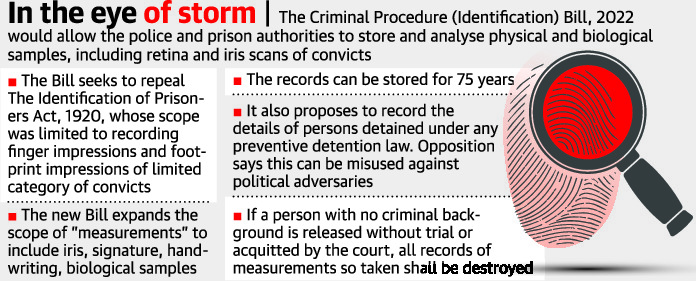Governance
Criminal Procedure (Identification) Bill, 2022
- 29 Mar 2022
- 6 min read
For Prelims: Lok Sabha, Indian Penal Code, preventive detention, National Crime Records Bureau, fundamental rights of citizens, right to privacy, The Criminal Procedure (Identification) Bill, 2022
For Mains: The Criminal Procedure (Identification) Bill, 2022 and issues, Judgements & Cases, Fundamental Rights
Why in News?
Recently, the Criminal Procedure (Identification) Bill, 2022 was introduced in Lok Sabha.
What are the Provisions of the Bill?
- Collection of Samples:
- It would allow the police and prison authorities to collect, store and analyse physical and biological samples, including retina and iris scans.
- Resistance to or refusal to allow the taking of measurements under this Act shall be deemed to be an offence under section 186 of the Indian Penal Code.
- It will also seek to apply these provisions to persons held under any preventive detention law.
- It also authorises for taking measurements of convicts and "other persons" for identification and investigation in criminal matters.
- It doesn't define the "other persons" implying its ambit beyond convicts, arrested persons, or detainees.
- It would allow the police and prison authorities to collect, store and analyse physical and biological samples, including retina and iris scans.
- Power to Record Measurement:
- Police personnel up to the rank of Head Constable have been authorised to record the measurements.
- The National Crime Records Bureau (NCRB) will be the repository of physical and biological samples, signature and handwriting data that can be preserved for at least 75 years.
- NCRB has also been empowered to share the records with any other law enforcement agency.
What is the Significance of the Bill?
- Making Use of Modern Techniques:
- The bill makes provisions for the use of modern techniques to capture and record appropriate body measurements.
- The existing law — the Identification of Prisoners Act — dated back to 1920 and allowed taking only fingerprint and footprint impressions of a limited category of convicted persons.
- The bill makes provisions for the use of modern techniques to capture and record appropriate body measurements.
- Help Investing Agencies:
- The Bill seeks to expand the ‘‘ambit of persons’’ whose measurements can be taken as this will help the investigating agencies to gather sufficient legally admissible evidence and establish the crime of the accused person.
- Make the Investigation of Crime More Efficient:
- The bill provides legal sanction for taking appropriate body measurements of persons who are required to give such measurements and will make the investigation of crime more efficient and expeditious and will also help in increasing the conviction rate.
What are the issues with the Bill?
- It has been argued that the Bill was beyond the legislative competence of Parliament as it violated fundamental rights of citizens including the right to privacy.
- The Bill proposes to collect samples even from protestors engaged in political protests.
- It violates Article 20 (3) of the Constitution. The Bill implied use of force in collection of biological information, could also lead to narco analysis and brain mapping.
- Article 20(3) says that 'No person accused of an offence shall be compelled to be a witness against himself'.
- It also violates human rights provisions as laid out in the United Nations charter.
- Also, the implied use of force in clause 6(1) to take measurements violates the rights of prisoners laid down in a catena of Supreme Court judgements beginning with A K Gopalan 1950, Kharag Singh 1964, Charles Sobhraj 1978, Sheela Barse 1983, Pramod Kumar Saxena 2008.
What are the Related Initiatives taken by the Government?
- Crime and Criminal Tracking Network & Systems:
- It is a project for creating a comprehensive and integrated system for effective policing through e-Governance.
- The Home Ministry is working on the integration of the fingerprint database of the Central Finger Print Bureau (CFPB), and the NIST Fingerprint Image Software (NFIS).
- NFIS is a technology used by the United States Federal Bureau of Investigation (FBI), to match fingerprints.
- The government is also working on scaling up data collection.
- While the FBI has over 4 crore fingerprints in its database, the CFPB currently has a database of just over 10 lakh fingerprints.
UPSC Civil Services Examination, Previous Year Questions (PYQs)
Q. ‘Right to Privacy’ is protected under which Article of the Constitution of India?
(a) Article 15
(b) Article 19
(c) Article 21
(d) Article 29
Ans: (c)
Exp:
- In Puttaswamy v. Union of India case, 2017, the Right to Privacy was declared a fundamental right by the Supreme Court.
- Right to Privacy is protected as an intrinsic part of the Right to Life and Personal Liberty under Article 21 and as a part of the freedoms guaranteed by Part III of the Indian Constitution.




